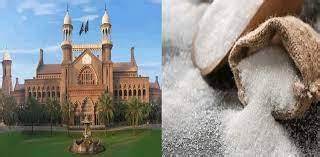
In a decisive step to bring relief to the people of Karachi, the city’s Commissioner has fixed the retail price of sugar at Rs173 per kilogram. This move comes at a critical time when the prices of essential commodities have been skyrocketing, burdening households and pushing inflation to uncomfortable highs. Sugar, being a widely consumed staple, had seen unpredictable price hikes in recent weeks, causing concern among consumers, especially those from middle- and lower-income groups.
The decision to fix sugar prices is part of a broader administrative effort to regulate the prices of essential items and ensure fair practices in the market. The Commissioner’s announcement is being seen as a crucial intervention to stabilize prices and safeguard the public from exploitation by profiteers and hoarders.
Rising Sugar Prices and the Need for Intervention
Over the past few months, sugar prices in Karachi had become increasingly volatile. Retail prices ranged between Rs180 and Rs200 per kilogram in different areas, depending on the availability and supply chain issues. The inconsistency in pricing led to confusion among consumers and traders alike, with many accusing wholesalers and retailers of artificial price inflation and stockpiling to create shortages.
The rising cost of sugar added pressure to the monthly budgets of countless families. As one of the most commonly used kitchen items, sugar’s price increase directly impacted tea shops, bakeries, and households alike. The Karachi Commissioner’s intervention was prompted by this growing concern and widespread public outcry.
The Decision: Fixing Sugar at Rs173 per Kilogram
After assessing the current market conditions, procurement costs, and consultation with relevant departments, the Commissioner officially fixed the retail price of sugar at Rs173 per kilogram across the city. The directive applies to all markets, grocery stores, and retail outlets operating within Karachi.
This pricing policy aims to bring uniformity to the market, prevent overcharging, and protect consumers from exploitation. It also sends a strong message to hoarders and black market players that unfair pricing practices will not be tolerated.

Implementation and Enforcement Measures
To ensure that the new pricing policy is followed, the Commissioner’s office has mobilized price control magistrates and inspection teams across Karachi. These teams will conduct regular visits to markets and retail shops to monitor compliance with the fixed price.
Strict penalties have been announced for those who violate the pricing order. Retailers caught selling sugar above the Rs173/kg mark could face hefty fines, temporary shop closures, or legal action under price control laws. Wholesalers have also been warned against creating artificial shortages or tampering with supply chains.
Citizens are being urged to report overcharging and hoarding incidents directly to the district administration or through dedicated complaint helplines. The administration believes that public cooperation is key to the success of this initiative.
Public Response and Market Reactions
The public has largely welcomed the move, especially those from working-class backgrounds. For many, the decision brings much-needed financial relief and a sense of accountability from the government. Several households expressed hope that similar steps would be taken for other essential commodities like wheat flour, cooking oil, and pulses.
However, some retailers and wholesalers voiced concerns over the feasibility of selling sugar at the fixed rate. They argue that due to increased transportation costs, fuel prices, and supply chain issues, maintaining profit margins while adhering to the new price will be challenging. In response, the Commissioner’s office has stated that the price was set after a thorough evaluation of the market and is sustainable if profiteering is eliminated.
Broader Economic Context
Pakistan has been facing persistent inflation, with food items bearing the brunt of price volatility. Factors such as currency depreciation, high fuel prices, and global commodity fluctuations have compounded the problem. In such a scenario, administrative control over essential commodity prices becomes necessary to maintain balance in the domestic market.
Fixing sugar prices in Karachi is not an isolated measure but part of a national effort to control inflation. Other provinces have also been considering similar steps to address commodity price instability. While market forces play a role in determining prices, unchecked profiteering and weak enforcement mechanisms often lead to exploitation.
The Road Ahead
Although the price fixation is a positive move, long-term solutions require structural reforms in the sugar industry. This includes:
- Improved Supply Chain Management: Efficient logistics can ensure steady supply and prevent artificial shortages.
- Transparency in Sugar Production: Monitoring sugar mills and inventories can discourage stockpiling.
- Subsidies and Incentives: Providing subsidies to farmers and producers can reduce production costs and ease pressure on the retail market.
- Digital Monitoring Systems: Implementing real-time tracking of commodity distribution can help control illegal practices.
The success of the Commissioner’s decision will depend on continued enforcement, stakeholder cooperation, and active citizen participation.
Conclusion
The Karachi Commissioner’s decision to fix sugar prices at Rs173 per kilogram is a bold and much-needed step to protect consumers from unchecked inflation. By establishing a uniform price and ensuring its strict implementation, the administration is reinforcing its commitment to economic justice and public welfare. However, for this policy to deliver lasting results, it must be supported by long-term reforms and vigilant enforcement.
As Karachi continues to grow as a metropolitan hub, ensuring price stability in essential commodities is not just a necessity—it is a right of the people. The move signals a proactive approach toward addressing inflation and restoring balance to the city’s markets.



